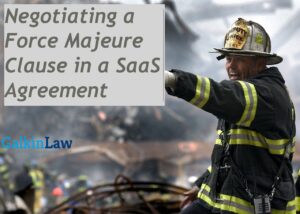
In the dynamic world of Software as a Service (SaaS) agreements, it’s essential to consider the unexpected. This is where a force majeure clause comes into play—a vital contractual element that can shield both parties from liability when unforeseen events occur. But what exactly does a force majeure clause entail, and how should you approach it in a SaaS context?
💡 What is a Force Majeure Clause?
A force majeure clause is a provision in a contract that frees both parties from their obligations if an extraordinary event or circumstance beyond their control prevents one or both of them from fulfilling those obligations. This can include natural disasters, war, pandemics, or other unforeseen disruptions.
🌩️ Conditions That May Qualify as Force Majeure Events
Common events that might be classified as force majeure include:
- Natural disasters: Earthquakes, floods, hurricanes, etc.
- Acts of war or terrorism
- Government actions: New laws or regulations
- Pandemics and epidemics
- Strikes and labor disputes
- Cyber-attacks: A growing concern in the digital age
However, some vendors may attempt to broaden this list to include events like economic downturns or supply chain disruptions, which customers might find less justifiable.
🚫 Customer Concerns
From the customer’s perspective, it’s important to scrutinize the force majeure clause carefully. Some common points of contention might include:
- Broad definitions: Customers may object to overly broad definitions that could let the vendor off the hook too easily.
- Economic hardships: Including economic downturns as force majeure events may seem unfair, as these are often seen as a normal business risk.
- Cybersecurity incidents: Given that cybersecurity is a critical component of a SaaS provider’s responsibility, customers may resist including cyber-attacks as force majeure events.
📋 Vendor Responsibilities
For a vendor to successfully invoke a force majeure clause, there are typically several responsibilities they must adhere to:
- Prompt notification: The vendor must inform the customer as soon as they become aware of the force majeure event.
- Mitigation efforts: Vendors are often required to take reasonable steps to mitigate the impact of the event.
- Resumption of services: The vendor must resume services as soon as the force majeure event is over, and perhaps provide a plan for doing so.
- Documentation: Detailed records of the event and the actions taken may need to be provided.
✨ Final Thoughts
Negotiating a force majeure clause in a SaaS agreement is about balance. Vendors seek to protect themselves from liability in uncontrollable situations, while customers aim to ensure that such protections aren’t overly broad or unjustified. A carefully crafted clause can provide security for both parties, ensuring that the SaaS relationship remains fair, even in the face of the unexpected.
#ForceMajeure #SaaS #ContractLaw #LegalTips #BusinessContinuity
